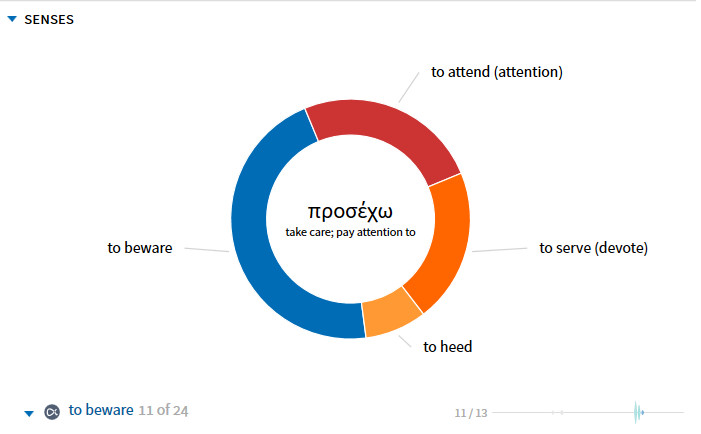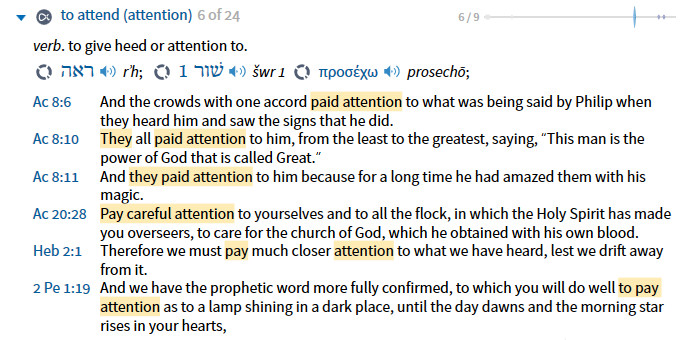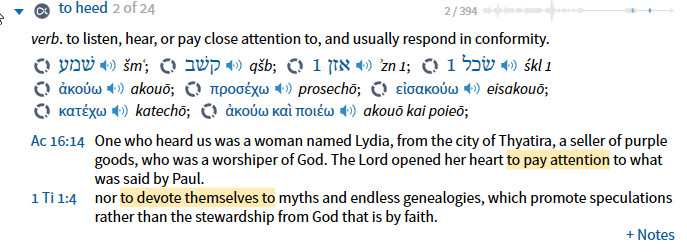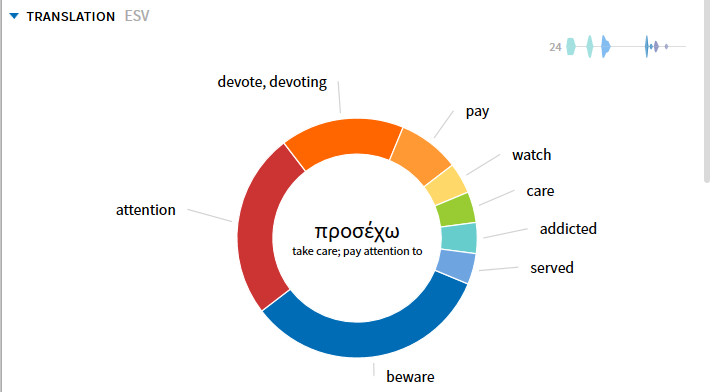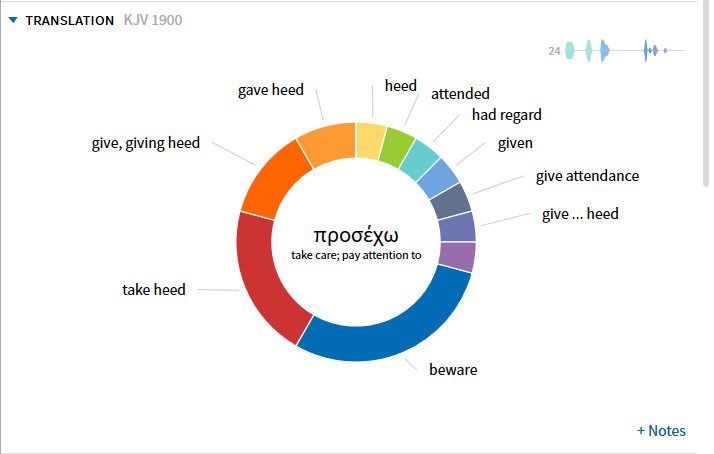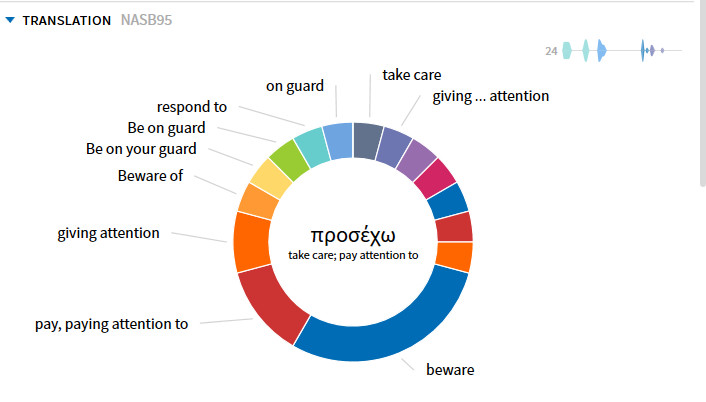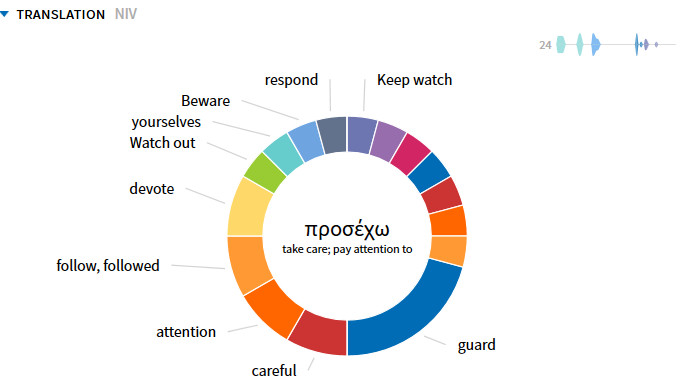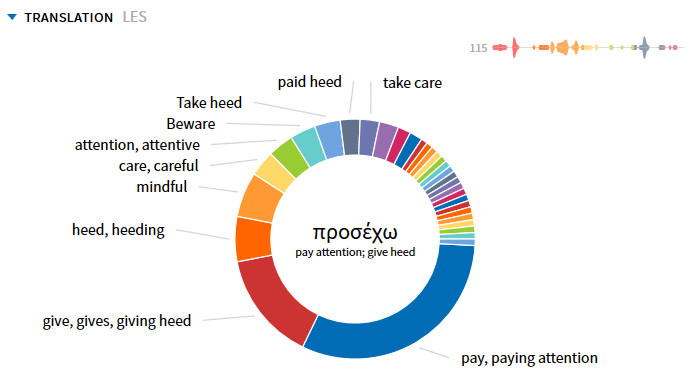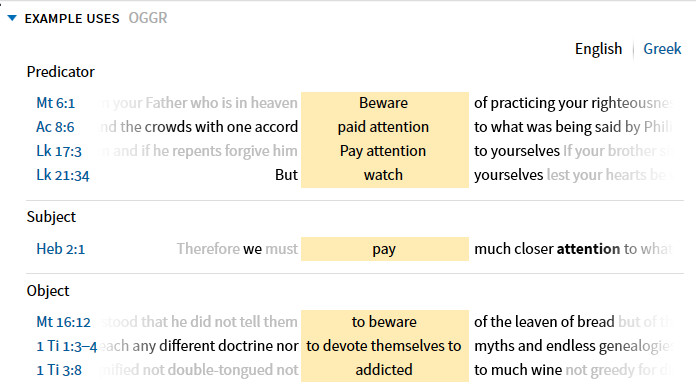Beware
- 2016-03-18
- By Editor
- Posted in Bible Study, Word Study
Beware – What that word entails in the usage at Matthew 7:15
“Beware” in English: verb – be cautious and alert to the dangers of: consumers were warned to beware of faulty packaging – synonyms: be on your guard, watch out, look out, be alert, be on the lookout,
Matthew 7:15 (ESV)
15 “Beware (G4337 – LN27.59) of false prophets, who come to you in sheep’s clothing but inwardly are ravenous wolves.
Word in Greek: προσέχω – Lemma Translation: “prosecho”
LN 27.59 προσέχωa; ἐπέχωa: to be in a continuous state of readiness to learn of any future danger, need, or error, and to respond appropriately—‘to pay attention to, to keep on the lookout for, to be alert for, to be on one’s guard against.’
προσέχωa: προσέχετε δὲ τὴν δικαιοσύνην ὑμῶν μὴ ποιεῖν ἔμπροσθεν τῶν ἀνθρώπων ‘make certain that you do not perform your religious duties in public’ Mt 6:1.ἐπέχωa: ἔπεχε σεαυτῷ καὶ τῇ διδασκαλίᾳ ‘watch yourself and watch your teaching’ 1 Tm 4:16.[1]
In Louw-Nida it stresses be read but also to learn of what future dangers might be. To what error one’s false thinking could lead toward destruction and led astray from the true words of God.
That would be most fitting as ‘false prophets’ are that type of leaders that function to lead the hearer away from the truth of God. God states that ‘narrow is the way’ and the false shepherds would modify those words to reduce the true sense of Jesus’s words with some misleading comparison. One might say that looking at the millions of people on earth what % would consist of a few (narrow) entrance? Questions that place man into human logic and freeing themselves from the constraints of Christ’s teaching.
This was the entire message of Jesus during this sermon on the mount to take their (the religious leaders of that day) teachings and show what God’s way really is. An example might be showing how they were quick to judge others and Christ reminded them as they needed to remove the blinders from their own eyes first. Matthew 7:1-6 (ESV)
1 “Judge not, that you be not judged.
2 For with the judgment you pronounce you will be judged, and with the measure you use it will be measured to you.
3 Why do you see the speck that is in your brother’s eye, but do not notice the log that is in your own eye?
4 Or how can you say to your brother, ‘Let me take the speck out of your eye,’ when there is the log in your own eye?
5 You hypocrite, first take the log out of your own eye, and then you will see clearly to take the speck out of your brother’s eye.
6 “Do not give dogs what is holy, and do not throw your pearls before pigs, lest they trample them underfoot and turn to attack you.
G4337 προσέχω [prosecho /pros·ekh·o/] v. From 4314 and 2192; GK 4668; 24 occurrences; AV translates as “beware” seven times, “give heed to” five times, “take heed to” three times, “give heed unto” once, “take heed” once, “take heed unto” once, “take heed whereunto + 3739” once, and translated miscellaneously five times. 1 to bring to, bring near. 1a to bring a ship to land, and simply to touch at, put in. 2 to turn the mind to, attend to be attentive. 2a to a person or a thing: of caring for, providing for. 3 to attend to one’s self, i.e. to give heed to one’s self. 3a give attention to, take heed. 4 to apply one’s self to, attach one’s self to, hold or cleave to a person or a thing. 4a to be given or addicted to. 4b to devote thought and effort to.[2]
Note the breakdown of how this Greek word was used in various ways such as: to beware, to attend, to serve, to heed:
Viewing the “Sense” of the word used here. This Greek word is used with this sense some 11 of the 24 references that the root words is used in the scriptures.
The Greek word in Matt. 7:15 carried the sense of “to beware” – a verb to be on one’s guard, be cautious or wary about, or be alert to… Here is a listing of the texts where this sense of the Greek word is used some 11 times.
In 6 of the 24 times this Greek word was used it carried the sense of: “to give heed or attention to.
In 5 of the 24 times this Greek word was used to carry the sense of “to serve (devote)”
In 2 of the 24 times this Greek word was used to carry the sense of “to heed”
Review the definition again and note how the various forms are used in the 24 times found in scriptures listed above.
LN 27.59 προσέχωa; ἐπέχωa: to be in a continuous state of readiness to learn of any future danger, need, or error, and to respond appropriately—‘to pay attention to, to keep on the lookout for, to be alert for, to be on one’s guard against.’
προσέχωa: προσέχετε δὲ τὴν δικαιοσύνην ὑμῶν μὴ ποιεῖν ἔμπροσθεν τῶν ἀνθρώπων ‘make certain that you do not perform your religious duties in public’ Mt 6:1.ἐπέχωa: ἔπεχε σεαυτῷ καὶ τῇ διδασκαλίᾳ ‘watch yourself and watch your teaching’ 1 Tm 4:16.
In Louw-Nida it stresses be read but also to learn of what future dangers might be. To what error one’s false thinking could lead toward destruction and led astray from the true words of God.
Compare the way it was translated in the ESV version:
To provide a clue as to the difference that various translating teams translated the same Greek Word note the KJV, NASB, NIV, LES
You see which one by the initials after the word “Translation” in the top left of each box.
LES = the Lexham English Septuagint
By reviewing the wheels one can see the various shades of the Greek word and an ideal of the more complete understanding of the message being conveyed with the first word on Matthew 7:15
Matthew 7:15 (ESV)
15 “Beware of false prophets, who come to you in sheep’s clothing but inwardly are ravenous wolves.
Using the 1st verse in each of the 4 sections shown above is an example of it’s use:
[1] Louw, J. P., & Nida, E. A. (1996). Greek-English lexicon of the New Testament: based on semantic domains (electronic ed. of the 2nd edition., Vol. 1, pp. 332–333). New York: United Bible Societies.
[2] Strong, J. (1995). Enhanced Strong’s Lexicon. Woodside Bible Fellowship.
Recent Posts
Archives
- April 2022
- February 2022
- November 2021
- October 2021
- August 2021
- July 2021
- May 2021
- April 2021
- September 2020
- August 2020
- June 2020
- March 2020
- February 2020
- November 2019
- October 2019
- September 2019
- August 2019
- July 2019
- June 2019
- May 2019
- January 2019
- December 2018
- October 2018
- August 2018
- June 2018
- February 2018
- January 2018
- December 2017
- November 2017
- January 2017
- December 2016
- November 2016
- October 2016
- September 2016
- August 2016
- July 2016
- June 2016
- May 2016
- April 2016
- March 2016
- February 2016
- January 2016
- December 2015
- November 2015
- September 2015
- August 2015
- June 2015
- January 2015
- December 2014
- November 2014
- October 2014
- September 2014
- August 2014
- July 2014
- June 2014
- May 2014
- April 2014
- March 2014
- February 2014
- January 2014
- December 2013
- November 2013
- October 2013
- September 2013
- August 2013
- July 2013
- June 2013
- May 2013
- April 2013
- February 2013
- January 2013
- December 2012
- November 2012
- October 2012
- September 2012
- August 2012
- July 2012
- August 2011
Categories
- Bible Discussion
- Bible Questions Answered
- Bible Study
- Bible Study Made Easy
- Bible Study Via Software
- Bible Topics
- Christ day and time
- Demo Articles
- Developing
- FP RokTabs #1
- FP RokTabs #2
- God's Amazing Convents
- History of the English Bible
- Home & Family
- Illustrations
- Manifestations
- Marriage
- Men
- Men in the Bible
- RokNewsFlash
- RokNewsPager
- RokStories
- Spirituality
- Sub RokTabs
- Uncategorized
- Various Articles/Topics
- Word
- Word Study


